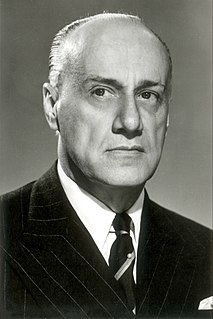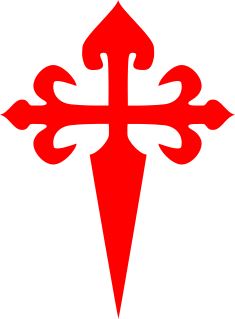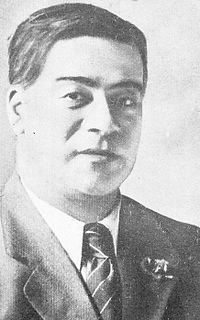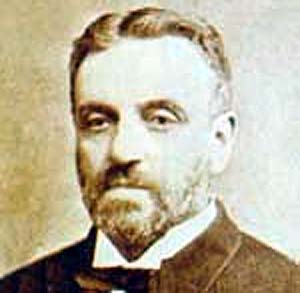
The Concertación was a coalition of center-left political parties in Chile, founded in 1988. Presidential candidates under its banner won every election from when military rule ended in 1990 until the conservative candidate Sebastián Piñera won the Chilean presidential election in 2010. In 2013 it was replaced by New Majority coalition.

General Carlos Ibáñez del Campo was a Chilean Army officer and political figure. He served as President twice, first between 1927 and 1931, and then from 1952 to 1958, serving for 11 years in office.
This article gives an overview of liberal and radical parties in Chile. It is limited to liberal and radical parties with substantial support, mainly proved by having had a representation in parliament. The sign ⇒ means a reference to another party in that scheme. For inclusion in this scheme, parties do not necessarily need to have labeled themselves as a liberal party.

Jorge Alessandri Rodríguez was the 27th President of Chile from 1958 to 1964, and was the candidate of the Chilean right in the crucial presidential election of 1970, which he lost to Salvador Allende. He was the son of Arturo Alessandri, who was president from 1920 to 1925 and again from 1932 to 1938.

Arturo Fortunato Alessandri Palma, GCTE was a Chilean political figure and reformer, who served thrice as the President of Chile, first between 1920 and 1924, then for part of 1925, and finally from 1932 until 1938.
The Radical Democracy, was a Chilean centre-right political party. The party, created in 1969, was dissolved in 1973, and reappeared in 1983 before disbanding permanently in 1990.

The Conservative Party of Chile was one of the principal Chilean political parties since its foundation in 1836 until 1948, when it broke apart. In 1953 it reformed as the United Conservative Party and in 1966 joined with the Liberal Party to form the National Party. The Conservative Party was a right-wing party, originally created to be the clericalist, pro-Catholic Church group.
The Liberal Party of Chile was a Chilean political party created by a faction of pipiolos in 1849. After the conservative victory in the Chilean Civil War of 1829 the liberals became the principal opposition party to the Conservative Party. During the Liberal Party's early history one of its main goal was to create a new constitution to replace the Chilean Constitution of 1833. Rigged election helped to prevent the Liberal Party's presidential candidates to be elected until 1861, during that time elements of the liberal party made attempts to overthrow the government, these were the Revolution of 1851 and the Revolution of 1859. These failed insurrections led a large number of liberals into exile, among them Benjamín Vicuña Mackenna. In 1863 a group of liberal split off to form the Radical Party which would hold power from 1938 to 1952. Originally an anticlericalist party that championed classical liberalism, the liberals later became a right-wing party.

The National Party of Chile was a Chilean political party formed by the union of the United Conservative Party, the Liberal Party and the National Action.

The National Party of Chile, also known as the Montt-Varist Party was a Chilean political party formed in 1857 as a split from the Conservatives by the supporters of President Manuel Montt and Interior Minister Antonio Varas. The National Party had a liberal ideology and was primarily supported by businessmen and bankers, particularly the influential Edwards family. It was merged into the Liberal Party in 1933. The monttvarista National Party is not to be confused with the National Party formed in 1966.

The Radical Party of Chile was a Chilean political party. It was formed in 1863 in Copiapó by a split in the Liberal Party. Not coincidentally, it was formed shortly after the organization of the Grand Lodge of Chile, and it has maintained a close relationship with Chilean Freemasonry throughout its life. As such, it represented the anticlericalist position in Chilean politics, and was instrumental in producing the "theological reforms" in Chilean law in the early 1880s. These laws removed the cemeteries from the control of the Roman Catholic Church, established a civil registry of births and death in place of the previous recordkeeping of the church, and established a civil law of matrimony, which removed the determination of validity of marriages from the church. Prior to these laws, it was impossible for non-Catholics to contract marriage in Chile, and meant that any children they produced were illegitimate. Non-Catholics had also been barred from burial in Catholic cemeteries, which were virtually the only cemeteries in the country; instead, non-Catholics were buried in the beaches, and even on the Santa Lucia Hill in Santiago, which, in the 19th century, functioned as Santiago's dump.

The Parliamentary Era in Chile began in 1891, at the end of the Civil War, and spanned until 1925 and the establishment of the 1925 Constitution. Also called "pseudo-parliamentary" period or "Parliamentary Republic", this period was thus named because it established a quasi-parliamentary system based on the interpretation of the 1833 Constitution following the defeat of President José Manuel Balmaceda during the Civil War. As opposed to a "true parliamentary" system, the executive was not subject to the legislative power but checks and balances of executive over the legislature were weakened. The President remained the head of state but its powers and control of the government were reduced. The Parliamentary Republic lasted until the 1925 Constitution drafted by President Arturo Alessandri and his minister José Maza. The new Constitution created a presidential system, which lasted, with several modifications, until the 1973 coup d'état.
The Liberal Democratic Party called also balmacedist was one of the impellers of the Chilean parliamentary system from 1891 to 1925.
After the 1891 Chilean Civil War and the dissolution of the coalition between conservatives, radicals and antibalmacedist liberals the Radical Party, the Democrat Party and several liberal organizations formed the Liberal Alliance. It was the main opposer of the Coalition. Along with the Coalition, it was one of the two parties of the bipartidist system of that period, the era of the Chilean parliamentary republic. The Alliance would later be called the Liberal Union, during a period in which it was a union of the radicals, the democrats and all liberal groups. It disappeared in 1925.

The Presidential Republic is the period in the History of Chile spanning from the approval of the 1925 Constitution on 18 September 1925, under the government of Arturo Alessandri Palma, to the fall of the Popular Unity government headed by the President Salvador Allende on September 11, 1973. The period spans the same time as the "Development inwards" period in Chilean economic history.

The United Conservative Party was a right-wing Chilean political party founded in December 1953 after the merger of the Traditionalist Conservative Party and a faction of the Social Christian Conservative Party, issued from the Conservative Party. It supported for the 1958 presidential election the candidacy of Jorge Alessandri and participated, along with the Liberal Party and supporters of former president Carlos Ibáñez del Campo, in its government. In 1962, it participated in the Democratic Front of Chile center-right coalition which opposed the left-wings FRAP coalition and supported for the 1964 presidential election Eduardo Frei Montalva.

The Agrarian Labor Party was a Chilean political party supporting the candidacy of Carlos Ibáñez del Campo for the 1952 presidential election. Formed in 1945, it was dissolved in 1958.
The Democratic Party of Chile was a Chilean political party created by a left-wing faction of the Democrat Party in 1932. It was created by a leftist faction of the Democrat Party, which opposed the right-wing group that officially supported the government of Arturo Alessandri.
The following lists events that happened during 1925 in Chile.
The Socialist Radical Party was a centre-left political party of Chile that existed from 1931 to 1941.













